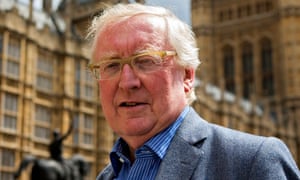As a former child protection manager warned that a "powerful elite" of at least 20 prominent figures carried out the "worst form of abuse", the former health minister Lord Warner described the sexual abuse of children as a "power drive".
Warner, a health minister in 2003-07 who conducted an inquiry into child abuse in Birmingham in 1992, spoke out after the home secretary, Theresa May, announced a national inquiry into how the authorities may have ignored child abuse at Westminster.
He said: "They have been slow and piecemeal getting to this point. I think victims and others need to be able to give testimony and give their evidence.
"It is vital that the inquiry is sufficiently comprehensive and over-arching. The important thing is to get at the truth to get at justice, to get what happened in institutions, and to get the right answers for the future. The appalling examples of child protection abuse we have seen must never be allowed to happen again."
MPs on the home affairs select committee will question Mark Sedwill, the home office's permanent secretary, on Tuesday afternoon over the loss of 114 potentially relevant files on child abuse dating back to the 1980s.

Warner said his inquiry in 1992 showed how children's homes were targeted by powerful paedophiles. He told the Today programme on BBC Radio 4: "Some of these children's homes were targeted by people in power, powerful people. Indeed, sexual abuse of children is a power drive. That's what a lot of it is about.
"It is possible that people who were authoritative, powerful in particular communities did sometimes have access to children's homes. We know for historical purposes that children's homes were a supply line sometimes."
Warner, a director of social services in Kent in the 1980s, said insufficient action was taken to deal with child abuse in that decade because there was "disbelief in the public mind".
He said: "It is pretty distasteful stuff. Society has found it difficult to come to terms with this … We still had an air of deference about people in authority.
"A cover-up means something is very organised. I think much more of this is about people being insensitive to some of these concerns and not being as preoccupied with protecting vulnerable people – children and adults."
Peter McKelvie, a former child protection manager whose allegations about child abuse led to a police inquiry in 2012, claimed that at least 20 prominent people abused children.
McKelvie told BBC2's Newsnight: "I believe that there is strong evidence – and an awful lot of information that can be converted into evidence if it is investigated properly – that there has been an extremely powerful elite amongst the highest levels of the political classes for as long as I am alive, and I am 65.
"There has been sufficient reason to investigate it over and over again, certainly for the last 30 years. There has always been the block and the cover-up and the collusion to prevent that happening."
He added: "For the first time I have got a belief that survivors will come forward and justice will be served for a lot of survivors. Unfortunately it has been left so late that a lot of the abusers are now dead.
"We are looking at the Lords, we are looking at the Commons, we are looking at the judiciary, we are looking at all institutions where there will be a small percentage of paedophiles and a slightly larger percentage of people who have known about it but have felt that in terms of their own self-interest and self-preservation and for political party reasons it's been safer for them to cover it up rather than deal with it."
McKelvie, who served as a child protection manager in Hereford and Worcester, worked on the conviction of Peter Righton, a founding member of the Paedophile Information Exchange (PIE). Righton, who has since died, was convicted of importing child pornography. McKelvie told police in 2012 that West Mercia police had seven boxes of evidence including letters between Righton and other alleged paedophiles.
On Monday, May told the Commons she was establishing a public inquiry into how complaints of sexual abuse were treated, and sometimes ignored, in public bodies over several decades.
Ministers had been holding out against such a sweeping inquiry, but, facing charges of an establishment cover-up, succumbed and promised there would be no no-go areas for the investigation.
The inquiry will be able to examine the files of the security services and allegations that the Tory whips' office in the 1970s may have suppressed allegations of child abuse by members of the parliamentary party. It is also expected to take some evidence from victims.
Labour MPs pointed to a 1985 BBC documentary in which a former government whip between 1970 and 1973 said the Tory whips' office, when faced by an MP involved in "a scandal with small boys", would get him out of trouble, partly so the MP then felt obliged in the future to carry out the bidding of the whips.
May said she would look at plans, backed in principle by the Labour MP Tom Watson, to require public servants to report allegations of child abuse to officials in a form of mandatory whistleblowing. A duty to report would place some form of culpability on a public official if they knowingly withheld information concerning suspected child abuse.
Source : https://www.theguardian.com/society/2014/jul/08/children-homes-supply-line-paedophiles-lord-warner?CMP=share_btn_fb
